
An indie role-playing game is a role-playing game published outside traditional, "mainstream" means. Varying definitions require that commercial, design, or conceptual elements of the game stay under the control of the creator, or that the game should just be produced outside a corporate environment. Indie role-playing game designers participate in several development communities and game distribution networks. Indie games also grant their own awards committees.

An indie game, short for independent video game, is a video game typically created by individuals or smaller development teams without the financial and technical support of a large game publisher, in contrast to most "AAA" (triple-A) games. Because of their independence and freedom to develop, indie games often focus on innovation, experimental gameplay, and taking risks not usually afforded in AAA games. Indie games tend to be sold through digital distribution channels rather than at retail due to lack of publisher support. The term is synonymous with that of independent music or independent film in those respective mediums.
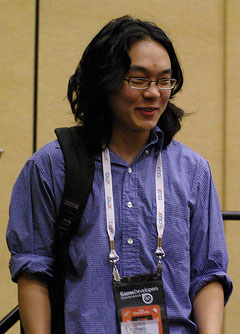
Derek Yu is an American independent video game designer, video game artist, and blogger. Yu has designed and co-designed several award-winning games, most famously Spelunky, Aquaria, and Eternal Daughter. He is also notable as a blogger and custodian of the influential TIGSource blog/community about independent video games. He has been called an "indie superstar" and a "genuine icon" of the video game industry.

Aether is a video game designed by Edmund McMillen and Tyler Glaiel and published by Armor Games, released on September 3, 2008. Players control a lonely boy and an octopus-like monster that the boy encounters, solving puzzles on different planets to restore them from monochrome to color. The pair travel through space by swinging on clouds and asteroids with the monster's elongated tongue, searching other planets for life to which the boy can relate. It is also a part of The Basement Collection.
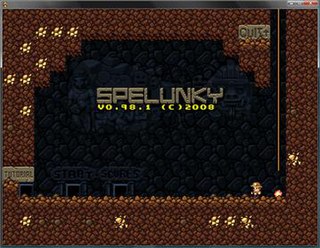
Spelunky is a 2008 source-available 2D platform game created by independent developer Derek Yu and released as freeware for Microsoft Windows. It was remade for the Xbox 360 in 2012, with ports of the new version following for various platforms, including back to Microsoft Windows. The player controls a spelunker who explores a series of caves while collecting treasure, saving damsels, fighting enemies, and dodging traps. The caves are procedurally generated, making each run-through of the game unique.
Gang Garrison 2 is an open-source indie video game "demake" of Valve's Team Fortress 2. Inspired by the 3D graphics of Team Fortress 2, it takes place in a 2D, 8-bit environment, while retaining its online multiplayer gameplay. The game was started by TIGSource users "mrfredman" and "MedO", with other users contributing to development. It was conceived as an entry into the 2008 TIGSource "Bootleg Demake" competition.

Spewer is a 2009 browser-based puzzle-platform game. It uses liquid physics through regurgitation as its core mechanic. Taking the role of a mysterious test subject, code named "Spewer", the player must vomit their way through over 60 levels while learning new abilities, changing forms and piecing together their purpose in the game. It is also a part of The Basement Collection.

Jonatan Söderström, also known as Cactus, is a Swedish video game developer noted for his unusual and innovative games. He is best known as the co-designer and programmer of Hotline Miami (2012) and Hotline Miami 2: Wrong Number (2015), but had prior to those games developed over 40 small freeware games, many of which were reviewed and lauded even in the mainstream video game press. His game Clean Asia! was nominated for both Excellence In Visual Arts and Excellence in Audio at the Independent Games Festival in 2008. In 2010, he won the IGF's Nuovo Award, which honours unconventional game development, for his puzzler Tuning.

Closure is a puzzle-platform game developed by American programmer Tyler Glaiel and artist Jon Schubbe with music and sound by Chris Rhyne. Originally available as a Flash game on the website Newgrounds, a full version of the game was later released for Microsoft Windows, Macintosh, and PlayStation Network in Spring 2012. A Linux port was included in the Humble Indie Bundle 7 in 2012.

Farbs is the pseudonym of Jarrad Woods, an indie gamer who gained media attention when he quit his job at gaming firm 2K Australia using a video game. When asked in an interview where the idea had come from to quit via video game, Woods stated "At the time there were a lot of articles touting indie games as a form of expression, and I hate writing so I wanted to express my goodbye to the team in some other way. I had planned to leave for a few months, but the message was more spontaneous".

Minecraft is a 2011 sandbox game developed by Mojang Studios. The game was created by Markus "Notch" Persson in the Java programming language. Following several early private testing versions, it was first made public in May 2009 before being fully released in November 2011, with Notch stepping down and Jens "Jeb" Bergensten taking over development. Minecraft is the best-selling video game in history, with over 238 million copies sold and nearly 140 million monthly active players as of 2021. It has been ported to several platforms.

Markus Alexej Persson, also known as Notch, is a Swedish video game programmer and designer. He is best known for creating the sandbox video game Minecraft, which has since become the best-selling video game in history; and for founding the video game development company Mojang Studios in 2009.
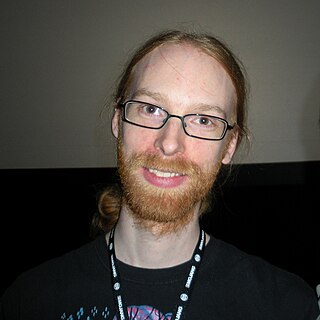
Jens Peder Bergensten, also known as Jeb or Jeb_, is a Swedish video game programmer and designer. He is best known as the lead designer of Minecraft, and currently serves as the Chief Creative Officer of Mojang Studios. In 2013, he, along with Minecraft creator Markus Persson, was named as one of Time's 100 most influential people in the world. As an employee of Mojang Studios, he had been co-developing Minecraft with Persson since 2010, became the lead designer in 2011, and assumed full control in 2014, when Persson left the company after its acquisition.
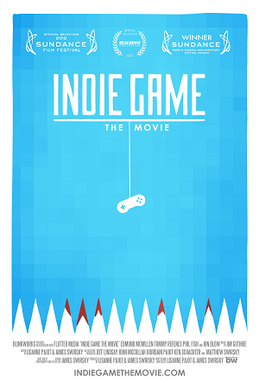
Indie Game: The Movie is a 2012 documentary film made by Canadian filmmakers James Swirsky and Lisanne Pajot. The film is about the struggles of independent game developers Edmund McMillen and Tommy Refenes during the development of Super Meat Boy, Phil Fish during the development of Fez, and also Jonathan Blow, who reflects on the success of Braid.
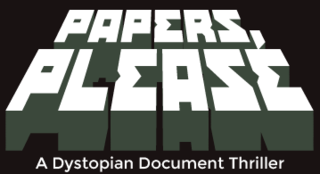
Papers, Please is a puzzle simulation video game created by indie game developer Lucas Pope, developed and published through his production company, 3909 LLC. The game was released on August 8, 2013, for Microsoft Windows and OS X, for Linux on February 12, 2014, and for iOS on December 12, 2014. A port for the PlayStation Vita was announced in August 2014 and was then released on December 12, 2017. A new port for iOS as well as for Android was released in August 2022.

Daniel Rosenfeld, better known by his stage/online name C418, is a German musician, producer and sound engineer, best known as the composer and sound designer for the sandbox video game Minecraft. He has also written and produced the theme for Beyond Stranger Things and the soundtrack for the Steam release of Cookie Clicker. He has also DJed for American rock band Anamanaguchi.
SkyBox Labs Inc. is a Canadian video game developer located in Burnaby, British Columbia. Founded in 2011 by Derek MacNeil, Shyang Kong and Steven Silvester formerly from EA Vancouver, they are mostly known for their work with Xbox Game Studios on the Halo, Age of Empires and Minecraft franchises.

Harpooned is a video game by Australia-based Irish developer Conor O'Kane for Windows and Macintosh computers. It is a serious game which questions the Japanese government's claim that their whaling program is scientific in nature. The game's website describes Harpooned as a "Cetacean Research Simulator, where you play the role of a Japanese scientist performing research on whales around Antarctica".
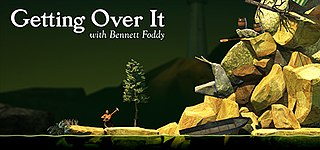
Getting Over It with Bennett Foddy is a platform game developed by Bennett Foddy. The game was released as part of the October 2017 Humble Monthly, on October 6, 2017, where it went on to be played by over 2.7 million players. A Steam version of the game was later released by Foddy on December 6, 2017, with a release on iOS that same day. The Android version was later released on April 25, 2018. The Linux version was available for beta testing in August 2018 and received a stable release in the same year.
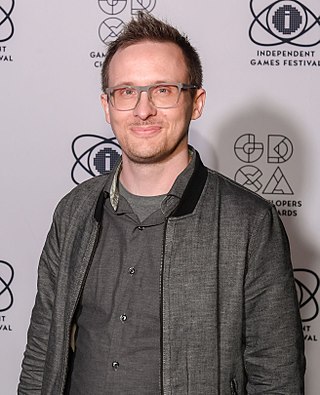
Bennett Foddy is an Australian video game designer based in New York. Raised in Australia and trained as a moral philosopher on topics of drug addiction, Foddy was a bassist in the electronic music group Cut Copy and a hobbyist game designer while he finished his dissertation. During his postdoctoral research at Princeton University and time on staff at Oxford University, Foddy developed games of very high difficulty including QWOP (2008), which became an Internet sensation at the end of 2010 with the rise of new online social sharing tools. He later became an instructor at the NYU Game Center. His most famous game aside from QWOP is Getting Over It with Bennett Foddy, a philosophical, physics-based platform game released in 2017.


















